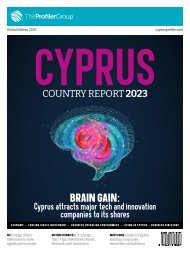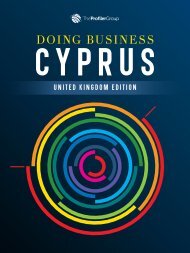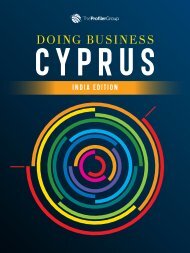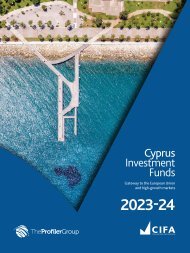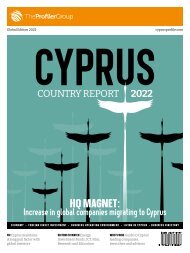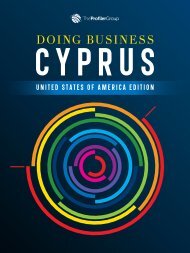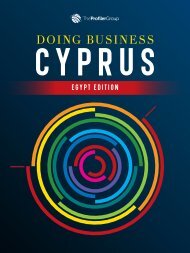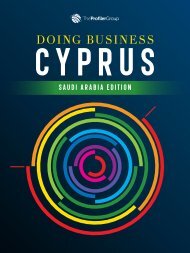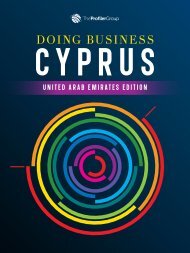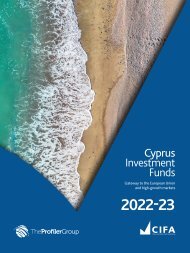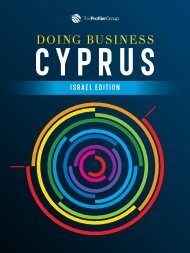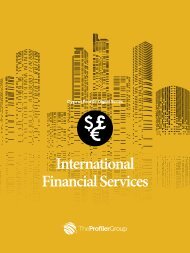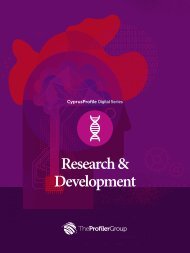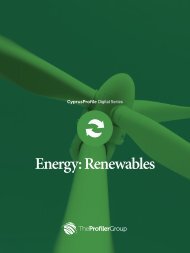2020 Cyprus Country Report
The 2020 Cyprus Country Report features in-depth articles on the economy, foreign direct investment, international trade and headquartering as well as detailed sector profiles and insights from Cyprus’ 100 most influential political, economic and business leaders shaping the future of their country and its industries.
The 2020 Cyprus Country Report features in-depth articles on the economy, foreign direct investment, international trade and headquartering as well as detailed sector profiles and insights from Cyprus’ 100 most influential political, economic and business leaders shaping the future of their country and its industries.
You also want an ePaper? Increase the reach of your titles
YUMPU automatically turns print PDFs into web optimized ePapers that Google loves.
Manufacturing & Industry<br />
Sector Profile<br />
Nicosia offices and factory, producing vitamin<br />
pre-mixes and pharmaceuticals for animal nutrition<br />
for export, particularly to the Middle East<br />
and Europe. Founded in 1978 and owned and<br />
operated by two families, it has won funding in<br />
cooperation with several British universities for<br />
the EU’s largest-ever research programme on<br />
animal nutrition.<br />
HOMEGROWN SUCCESS STORIES<br />
Quality and affordability are the hallmarks of<br />
Cypriot-made pharmaceuticals, which are sold in<br />
over 100 countries across the globe. The industry<br />
is led by Medochemie Ltd and Remedica Ltd,<br />
which invest heavily in research and innovation<br />
and spend significantly on continuously upskilling<br />
their workforces.<br />
A prime example of the sector’s significant potential<br />
for growth and foreign investment was the<br />
€260 million acquisition of Remedica by South<br />
Africa’s Ascendis Health Ltd in 2016. The South<br />
African corporation wanted a strategic platform<br />
within the EU for expansion and growth<br />
in the generic pharmaceutical industry in both<br />
European and emerging markets. The alliance<br />
has given Remedica the funding to embark on a<br />
new phase of development and the benefit of synergies<br />
with Ascendis.<br />
Medochemie, founded in 1976, develops,<br />
manufactures and distributes mostly generic<br />
pharmaceuticals and invests up to 7% of its turnover<br />
in research and innovation. The company has<br />
13 state-of-the-art manufacturing sites, of which<br />
nine are in <strong>Cyprus</strong>, one in the Netherlands and<br />
three in Vietnam. Its <strong>Cyprus</strong> factory can produce<br />
and pack 1.5 billion tablets and 300 million capsules<br />
per year. The company has expanded from<br />
its <strong>Cyprus</strong> base into promising markets across<br />
the world – to the Middle East and Africa, Far<br />
East and the Americas – and now operates in 107<br />
countries. <strong>Cyprus</strong>’ ideal location enables these<br />
two award-winning companies to distribute their<br />
products to markets in the region and far beyond.<br />
Their products bear ‘made in the EU’ labels – a<br />
badge of quality that assures consumers that what<br />
they are buying has met rigorous testing standards.<br />
Another major manufacturer and one of<br />
<strong>Cyprus</strong>’ biggest exporters is Vassiliko Cement<br />
Works, which boasts Europe’s largest single<br />
clinker production line and operates its own<br />
eponymous port. The company has an annual<br />
capacity of two million tons of cement, more<br />
than twice the island’s domestic needs. Its international<br />
customers are mostly <strong>Cyprus</strong>’ neighbours<br />
in the Eastern Mediterranean. Vassiliko<br />
has a variety of programmes to keep training and<br />
upgrading the skills of its 340-strong workforce,<br />
and a ‘talent academy’ that trains unemployed<br />
graduates for six months to a year, some of<br />
whom enter the workforce when vacancies arise.<br />
The company has embraced renewable energy<br />
sources as part of operations, which garnered it<br />
a ‘Gold Environmental Protector Award’ in 2019<br />
and a special honorary best performance distinction,<br />
and the Global CemFuels ‘Outstanding<br />
Alternative Fuels Project’ award in <strong>2020</strong>. The<br />
company also launched an 8 MWp photovoltaic<br />
park in <strong>2020</strong>.<br />
<strong>Cyprus</strong> has a 4,500-year-old history of copper<br />
mining, and today’s production methods are of<br />
the highest standard. Substantial investment<br />
in research, innovation and the latest mining<br />
technology has enabled Hellenic Copper Mines<br />
(HCM) to commercially exploit ores depleted<br />
by millennia of extraction. HCM set a European<br />
first in 1996 by introducing hydrometallurgy,<br />
a cost-effective and environmentally friendly<br />
way of exploiting low-grade ores, and it is a<br />
pioneer in bio-leaching. The high price of gold<br />
has also made it worthwhile for HCM to begin<br />
processing ores bearing the precious metal that<br />
it amassed while mining copper and to extract<br />
new ones, along with silver-bearing ores. HCM<br />
employs just under 100 people, nearly a third of<br />
them university graduates, and some 50 contractors<br />
daily, providing welcome employment<br />
in the rural Solea district and contributing to<br />
the rehabilitation of remote areas. HCM exports<br />
100% of its production to European destinations<br />
and its copper is classified among the top<br />
copper metal producers worldwide in terms<br />
of its purity (99.999% cu). Although currently<br />
the only operating mining company in <strong>Cyprus</strong>,<br />
some exploration companies are active because<br />
the island remains rich in low-grade mineral<br />
wealth. The mining of metals accounts for about<br />
5% of <strong>Cyprus</strong>’ industrial exports, a figure which<br />
would be far higher if industrial minerals and<br />
cement were included.<br />
Given the island’s small domestic market,<br />
manufacturers have adopted an international<br />
outlook to achieve growth. A good example of<br />
this is Elysée, an award-winning Nicosia-based<br />
company that designs and develops irrigation<br />
and piping systems that are sold in 65 countries<br />
from Europe and the Middle East to South Africa,<br />
Japan, Australia and New Zealand. Equally ambitious<br />
is Limassol-based Muskita Aluminium<br />
Industries Ltd, which designs and manufactures<br />
aluminium products and systems that are used<br />
across the globe in sectors ranging from aviation<br />
to agriculture. With 350 highly trained staff,<br />
the over 60-year old company was a forerunner<br />
in the European aluminium industry and holds<br />
many design patents and pioneered the use of robotics<br />
in Cypriot industry, both in its warehous-<br />
Manufacturing<br />
accounts for 5.4%<br />
of <strong>Cyprus</strong>’ GDP<br />
Industry<br />
accounts for 8.3%<br />
of <strong>Cyprus</strong>’ GDP<br />
6%<br />
of the workforce<br />
employed in<br />
manufacturing<br />
and industry<br />
Quality and<br />
affordability<br />
are the hallmarks of Cypriotmade<br />
pharmaceuticals,<br />
which are sold in over 100<br />
countries across the globe.<br />
Main destination for<br />
Cypriot manufactured<br />
exports: European Union<br />
over 50% of the market,<br />
Middle East 15%<br />
114 <strong>Country</strong> <strong>Report</strong> CYPRUS <strong>2020</strong>



